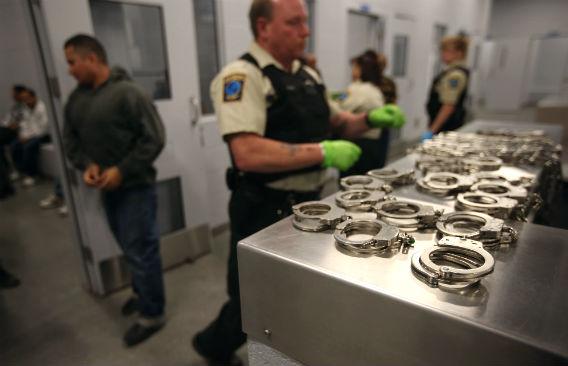Tucked onto page 567 of the Senate’s 844-page immigration reform bill is perhaps its most groundbreaking provision. For the first time, the U.S. government would voluntarily provide a free lawyer to an immigrant in deportation proceedings. The bill only gives lawyers to the most sympathetic: the mentally disabled, children, and the vaguely described “particularly vulnerable.” But the seeds are there for the broader right to counsel for detained immigrants that criminal defendants have received for 50 years. Congress should provide that. Immigrants who are detained and awaiting hearings cannot adequately represent themselves while jailed. And while other parts of immigration reform are hugely controversial, providing lawyers to detainees would be a surprisingly easy sell politically, if history is a guide.
In the past two decades, immigration detention has exploded. In 1995, the system held 7,500 people on any one day. Now, it detains 34,000 on any one day and 429,000 throughout the year, in over 250 facilities routinely denounced for substandard conditions, such as moldy food, poor medical care, overcrowding, excessive force, shackles, and solitary confinement. All this costs taxpayers $2 billion a year. Many detainees are long-term U.S. residents with green cards, and most have no criminal record. The majority are also nonviolent. They include people like Melida Ruiz, a 52-year-old New Jersey grandmother with 30 years in America, three children, two grandchildren (all U.S. citizens), and one nine-year-old misdemeanor drug-possession offense.
Immigration detention is a civil rather than criminal proceeding. Yet the Department of Homeland Security routinely treats immigrants as more dangerous than criminals. In New York, while 68 percent of criminal arrestees are released with no bail, 80 percent of immigration arrestees are denied bail entirely.
No detained immigrants are appointed lawyers while jailed. Judge Robert Katzmann of the U.S. Court of Appeals for the 2nd Circuit calls this the “immigrant representation crisis.” Some detainees hire lawyers, or are lucky enough to find free counsel. But 84 percent, in 2010, were not so lucky.
Stuck in detention facilities in rural areas like Lumpkin, Ga. or Florence, Ariz., detained immigrants, with a life in America at stake, must argue a deportation hearing on their own—in English, far from family who might find documents or witnesses, against trained government lawyers interpreting complex statutes. (“Nothing is ever simple with immigration law,” as Justice Samuel Alito has said.) No surprise, then, that Judge Katzmann’s study found 97 percent of detainees without lawyers lost their cases, while 74 percent of immigrants who were not detained and had counsel succeeded.
Today, 50 years after the Supreme Court granted counsel to criminal defendants in the landmark case Gideon v. Wainwright, most Americans are ready to extend this right to detained immigrants. Support for lawyers to help immigrants make their cases is high and bipartisan. In a recent poll, three-quarters of the respondents, including two-thirds of Republicans, supported lawyers for immigrants facing deportation. A 2009 report recommending appointed counsel for detainees was signed by conservative policymakers, like Asa Hutchinson, Bush administration Homeland Security undersecretary, and David Keene, who later became president of the National Rifle Association.
Without political blowback, Congress has extended the right to appointed counsel to accused violent felons at bail hearings (1984), convicted sex offenders at civil commitment hearings (2006), and suspected al-Qaida supporters in military detention hearings (2012), whether citizens or not. The arguments against doing the same for detained immigrants are weak. Jon Feere, of the Center for Immigration Studies, argues that so-called “illegal aliens” would be “guaranteed greater protections than citizens” because immigration proceedings are civil, not criminal. As law professor and former INS official Jan Ting put it, deportation does not “propose to punish anyone.” Tell that to long-time U.S. residents who are deported to a country they hardly know. What’s more, ordinary civil cases don’t involve being locked up. When they do, for example in juvenile detention and psychiatric commitment hearings, the Supreme Court generally has provided for appointed counsel.
Immigration law has yet to catch up because of the anachronistic 19th-century presumption that noncitizens, even longtime green card holders with jobs and families, are “strangers to the Constitution.” That presumption is beginning to change; last month, a federal court ordered the government to provide lawyers to mentally ill immigrant detainees. And Congress can rectify the situation without additional court rulings. The House and Senate would be following the lead of states that provide counsel in civil proceedings with high stakes, even without a constitutional requirement. For example, 44 states now provide counsel in proceedings to terminate parental rights. Deportation—banishment from work, family, and home—all too often has the same result.
Another argument against appointed counsel for immigrants is the expense. Yet the lawyers most likely pay for themselves by increasing the efficiency of immigration courts, reducing time spent in costly detention, and lowering the cost of caring for children separated from their parents. Detention of one immigrant costs nearly $60,000 per year—about the cost of one lawyer, who could help hundreds escape detention and fight deportation. That’s money much better spent.
